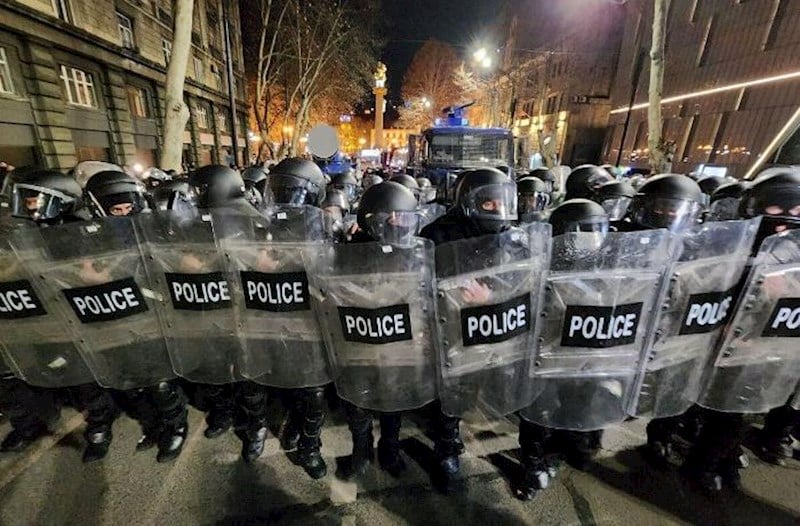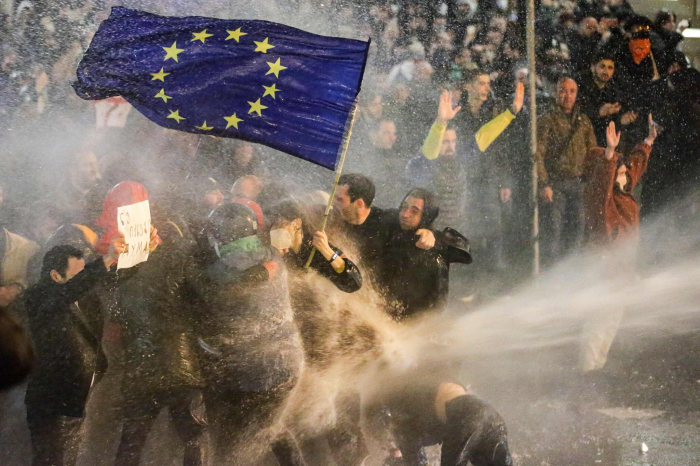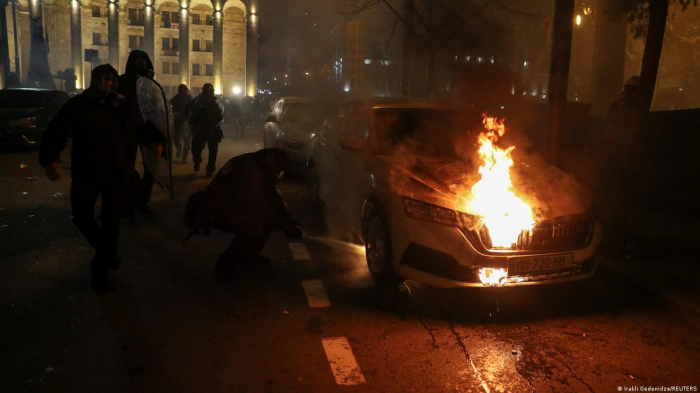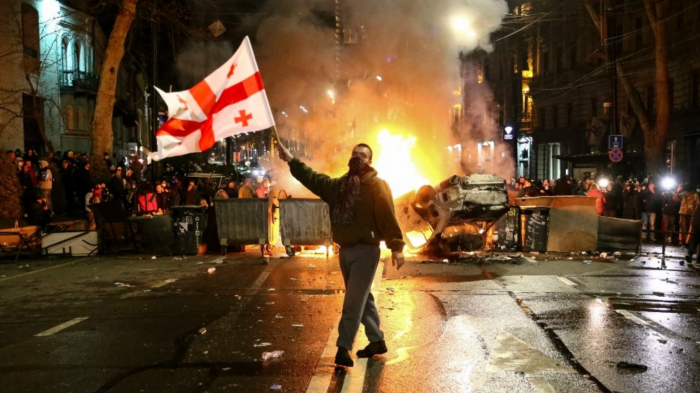Georgia has again become an area of geopolitical conflict, and the Georgian people are still looking for freedom in the small Freedom Square within this big square, and trying to find the way to freedom by lighting it with a "Molotov cocktail" is a Sisyphean labour…
Everything is changing in Georgia, foreign policy is not changing
After a short period, the ancient streets of Tbilisi, the capital of Georgia, were again lit by the flames of "Molotov cocktails" and fists, police batons rose in the air in the city's main square - Freedom, tear gas made people cry again, and the muffled sound of police shields responded the protestors' slogans. Thus, we observed the next act of the never-ending coloured revolution play. Georgia is experiencing another pain of the never-ending coloured revolution scenario, the country seems to be incapable of getting out of the closed circle of "coup-revolution-coup-revolution" since 2003 and is having difficulty entering a qualitatively new stage. In the last twenty years, an illusion was created in Georgian society that the process of "coup-revolution-coup-revolution" gave freedom to the country, strengthened independence and statehood, and founded democratic governance. An accurate analysis of the events of these days and the events of the last 20 years shows that in reality, Georgia has become a subject of a foreign administration, it does not matter whether the administration is carried out from Washington, Brussels or Moscow.

Foreign administration has turned the concepts of state independence and sovereignty into only formal concepts for Georgia. In 2005, US President George Bush's speech at Freedom Square in Tbilisi was a demonstration of the determination of the strong international position of Georgia. Saakashvili also seemed more determined than ever, but after 8 years, they no longer looked at the US and European Union flags with the same hope as before. Georgian society was tired of extreme Westerners, hopes were not fulfilled, and Tbilisi lost to Moscow in the war. Since 2013, the North wind has been blowing stronger in Georgia, and the forces protecting loyalty to Russia, under the leadership of Bdzina Ivanishvili, one of the former top managers of Gazprom, are in power. Even before 2013, and even after that, the Georgian people do not make the decisions regarding Georgia, and the interests of Washington and then mainly Moscow were taken as the basis in foreign policy steps. A part of the Georgian people, which appears every two or three years, plays the role of an active audience, leaders, rulers, and their patrons change, and the foreign administration does not change. Since 2003, the people of Georgia have become the executors of decisions made by foreign capitals. Georgia has become a testing ground for the Washington-Moscow conflict, and the Georgian people are still looking for freedom in the small Freedom square inside this big square, and trying to find the way to freedom by lighting it with a "Molotov cocktail" is a Sisyphean labour…

The experience of Georgia and Azerbaijan in protecting the socio-political environment from external influences and the things that happened around the adoption of the law on "Foreign influence agents" in Georgia can be considered the complications of foreign governance.
Garibashvili's government is trying to take advantage of the experience of the North, and in Washington and Brussels, this is considered a step that will significantly reduce their influence. There is no need to prove that the Western-oriented socio-political segment in Georgia is completely funded by the USA and the European Union. Those standing on the opposite side are nourished by the financial resources of Ivanishvili, the leader of the ruling political party, a Russian billionaire. The socio-political environment of the country is formed by external influence and financing. Their agenda is the agenda of foreign political investors, not the Georgian people. Such an illusion has been created in the people of Georgia that their rights are better protected in a free, democratic environment and free political competition, and decisions are made with comprehensive discussions. In reality, the agenda of foreign political investors is taken as a basis.
Attempts to pass the law on "Foreign Agent" in Georgia and what happened in connection with it also showed that even a law in Georgia cannot be passed without the consent of foreign leaders. In this case, it is hard to talk about the sovereign rights of the Georgian people.
This process also allows comparing the experience of Azerbaijan and Georgia. To eradicate external influences on the construction of the country's socio-political environment, and to define the country's internal political agenda based on national interests, the legislation was improved gradually and in stages in Azerbaijan.

Unlike the USA, Russia, and currently Georgia, Azerbaijan did not resort to the practice of declaring foreign-funded legal and physical entities as agents of foreign influence. Azerbaijan has developed appropriate legal opportunities by advancing the adoption of national socioeconomic development priorities as the main condition for attracting grant funds from foreign legal and natural persons. The national legislation was tightened against the circumstances that could make possible external influences on the formation of the socio-political environment of the country. At the same time, opportunities were created for the financing of projects and initiatives that exclude external influences on the formation of the country's social and political environment, and for local NGOs to attract funds from foreign donors. They were allowed to work with service contracts if the content of the activities was allowed. The tightening of legislation about possible external influences on the formation of the socio-political environment of the country has triggered the natural selection factor, and now donors who take the priorities of national socio-economic development as the basis of our country are cooperating. It is in this context that grant competitions for local NGOs are announced, and programs related to Azerbaijan take this approach as the basis. This process started in 2014, and what happened over eight years, especially the processes after the Patriotic War, in which Azerbaijan was victorious, showed that these steps serve to protect national interests and security interests.
The above-mentioned approach was taken as the basis for the establishment of media entities in the "Media" law adopted in 2021. If the founder of the media entity is a natural person, he must be a citizen of the Republic of Azerbaijan, permanently residing in the Republic of Azerbaijan. In the case of a legal entity, the majority share in its authorized capital (75 per cent) must belong to a citizen (citizens) of the Republic of Azerbaijan permanently residing in the Republic of Azerbaijan and (or) a legal entity (legal entities) registered in the Republic of Azerbaijan. Last year, the conceptual approach was taken as the basis for the adoption of the law "On Political Parties".
How was Azerbaijan prevented from becoming pro-war level?
Under the leadership of President Ilham Aliyev, the political and legal steps taken in the direction of eradicating external influences in the formation of the internal political and information environment in the public sector allow for ensuring security and effective protection of national interests while maintaining democratic foundations. These political and legal steps, on the one hand, preserve the financing opportunities of non-governmental organizations, public organizations, and mass media within the framework of Azerbaijan's national socio-economic development priorities through foreign donors, and on the other hand, provide effective control. Azerbaijan's experience has created a system that can maintain a balance between the basic interests and mission of civil society institutions, and the protection of security interests, rather than stigmatizing it as a foreign-funded physical and legal "foreign agent", "agent of foreign influence, person under the foreign influence". Unlike the experience of Russia or Georgia, the civil society and foreign donors quickly adapted this system to the new conditions and did not lead to sharp contradictions, which showed that these initiatives are aimed at protecting the interests of the society and are taken for granted by the society. The Russian-Ukrainian war proved once again that this system is effective and necessary in terms of protecting society from changes, ensuring harmonious development, as well as solving tasks determined by national interests.

In the terms of increasing tension on a global scale, raising the pressure of big countries on small countries, maintaining stability and effective protection of national interests becomes a priority. Small countries become the level of proxy wars of big countries, and this will likely lead to processes that will lead to long-lasting and destructive results, as in the 90s of the last century. This is quite a big risk, and to prevent it, it is necessary to increase the control, influence, and early intervention capabilities of the state, while ensuring the protection of basic human rights and freedoms in society. Currently, small countries can be evaluated as the main global challenge for the neighbours of big states. Some time ago, Kyrgyzstan, then Kazakhstan, and now Georgia faced a political crisis because they could not properly evaluate this call in time. This crisis is a manifestation of external influence to a large extent and will have severe consequences shortly.
The experience of Georgia indicates that it is impossible to guarantee the restoration of territorial integrity and balanced development by external powers. Georgia once again experienced just that and in 2008 they lost badly. At the moment, the echoes of this defeat can be heard in Tbilisi's Azadlig Square. It is a wiser choice to look for the path to real freedom not in the light of "Molotov cocktails", but in the light of the desk lamps in the offices of real political leaders...
Zaur Ibrahimov
Chairman of the "Prioritet" Center for Social and Economic Research Public Union
More about:
















































